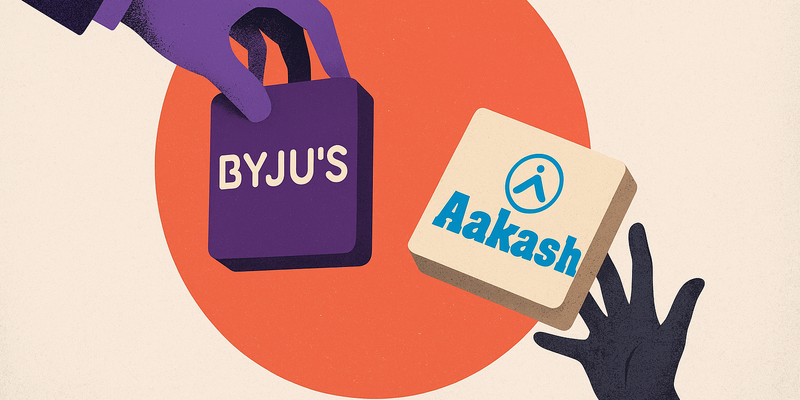Copyright yourstory

For the embattled edtech firm BYJU’S, the string of troubles shows no sign of easing. Once celebrated as the poster boy of India’s startup boom, the company is now watching its grip on a prized asset slip away amid ongoing insolvency proceedings. That is exactly what is happening to BYJU’S stake in Aakash Educational Services Limited (AESL). What once looked like a strategic anchor is now a shrinking piece of paper, and the latest legal ruling has made the shift hard to reverse. The latest trigger came when the Supreme Court of India, on Monday, November 3, declined to halt a rights issue at Aakash that will dilute BYJU’S holding to under 5% from roughly 25.75%. That judgment allows Aakash to raise fresh capital from its existing shareholders and others, leaving BYJU’S with a token stake and effectively removing its practical control over the test preparation business. This outcome did not arrive out of nowhere, but the decision is nevertheless a major turning point in a multi-year story of rapid expansion, financial strain and legal battles. Rewind to the purchase BYJU’S acquired Aakash in 2021 in a deal close to $1 billion. At the time, Aakash was attractive because it was a well-known chain of brick-and-mortar coaching centres that reached students preparing for competitive examinations across India. For BYJU’S, which built its business online, Aakash represented offline reach, predictable cash flow and a brand that could anchor a hybrid education play. The acquisition was one of the company’s most significant buys. BYJU’S troubles Troubles for BYJU’S began to emerge in public view from about 2022 onwards and grew sharper since then. The company missed filing deadlines, faced auditor resignations and ran into disputes with creditors. A series of high-profile governance and accounting questions reduced investor confidence. The insolvency process that has since dominated conversations about the edtech firm was formally initiated last year when a tribunal admitted petitions that triggered corporate insolvency resolution proceedings. Those events attracted the attention of international lenders and put strategic options, including the role of Aakash as either a financial lifeline or a bargaining chip, under strain. Once BYJU’S became entangled in insolvency proceedings, the commercial relationship with Aakash grew fraught. Creditors represented by GLAS Trust and the resolution professional for BYJU’S moved to prevent Aakash from taking steps they said would undermine the ability of lenders to recover value. Attempts were made at different tribunal levels to block an extraordinary general meeting for shareholders that would approve the rights issue. Those efforts were rejected by the relevant insolvency and appellate tribunals, and the Supreme Court has now likewise declined to intervene. The net effect is that Aakash can proceed with its recapitalisation plans without BYJU’S consent. Aakash’s difficulties Since the acquisition, its ownership has been the subject of multiple disputes and shifting shareholder arrangements. Large investors and founding families have negotiated fresh terms, and several adjudicatory interventions have tried to preserve interim arrangements. The current rights issue is intended to shore up Aakash’s finances and grant the company autonomy from the turbulence around BYJU’S. While for the test-prep firm’s management and minority shareholders that independence has practical appeal, for BYJU’S and its lenders, it represents an erosion of leverage. The dilution With less than 5% ownership, BYJU’S will be unable to exercise veto rights, appoint board members or meaningfully influence strategic decisions at Aakash. The immediate financial value of the residual stake is likely to be marginal compared with the price paid in 2021. From the creditors' point of view, the rights issue reduces a potentially recoverable asset that could have been used to negotiate settlements or fund repayments. Meanwhile, the recapitalisation could mean that Aakash’s employees and customers get some stability and insulation from the wider disputes engulfing BYJU’S. What might come next Aakash is likely to press ahead with the rights issue, and the new capital will be used to stabilise operations and reduce the company’s vulnerability to extraneous disputes. On the other hand, BYJU’S will face a narrower set of strategic options to resolve its insolvency, while its lenders will have to reassess recovery prospects in light of the lost influence over Aakash. The legal skirmishes are not over, but the balance of power on this particular front has shifted decisively. (Edited by Jyoti Narayan)



